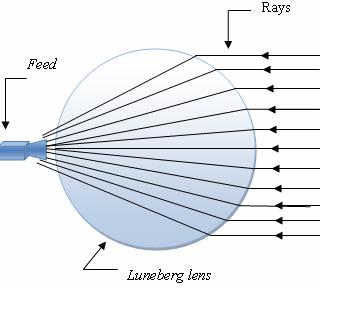Luneburg Antenna: Difference between revisions
No edit summary |
No edit summary |
||
| (One intermediate revision by the same user not shown) | |||
| Line 1: | Line 1: | ||
[[Image:Luneburg Lens1.jpg|right]] | |||
Luneburg lens is a new generation of antennas that has been developed since first being proposed in 1944. In the last few years it has developed applications in Microwaves, Communications and Telescopes area. | |||
The Luneburg lens is a spherical lens generally having a gradient of decreasing refractive index radially out from its center. The focusing properties of the Luneburg lens can be achieved through an infinite number of refractive-index solutions. | |||
== Applications == | == Applications == | ||
'''SKA'''. Proposals utilising multiple arrays with ultra-broadband capability and wide viewing in the microwave radio spectrum are proposed. | |||
'''Arecibo.''' A Luneburg antenna lens configured as a Retroreflector (developed by the CSIRO) is configured a subreflector feedpoint as a replacement for the 430Mhz line feed at Arecibo. | |||
== Reference == | == Reference == | ||
[1] Rudolf K. Luneburg, Mathematical Theory of Optics. Providence, RI :Brown Unit, Press, Providence, RI, 1944, pp.189-213. | |||
[[Category:Fields | [[Category:Fields,_waves_&_electromagnetics]] | ||
[[Category:Antennas]] | [[Category:Antennas]] | ||
[[Category:Microwave_technology]] | [[Category:Microwave_technology]] | ||
Latest revision as of 16:29, 17 September 2015
Luneburg lens is a new generation of antennas that has been developed since first being proposed in 1944. In the last few years it has developed applications in Microwaves, Communications and Telescopes area.
The Luneburg lens is a spherical lens generally having a gradient of decreasing refractive index radially out from its center. The focusing properties of the Luneburg lens can be achieved through an infinite number of refractive-index solutions.
Applications
SKA. Proposals utilising multiple arrays with ultra-broadband capability and wide viewing in the microwave radio spectrum are proposed.
Arecibo. A Luneburg antenna lens configured as a Retroreflector (developed by the CSIRO) is configured a subreflector feedpoint as a replacement for the 430Mhz line feed at Arecibo.
Reference
[1] Rudolf K. Luneburg, Mathematical Theory of Optics. Providence, RI :Brown Unit, Press, Providence, RI, 1944, pp.189-213.
